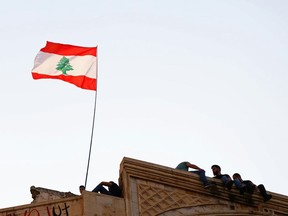Henry Srebrnik: In a dangerous Middle East is Lebanon doomed?
The country, or what’s left of it, is on its own

Article content
Everyone understands that Lebanon is, by any measure, a failed state, paralyzed by its sectarianism. Its various Christian, Druze and Muslim communities have, over the past four decades, destroyed what little unity it possessed.
More than a dozen religious sects coexist in a precarious balancing act, reflected in a power-sharing system that reserves government posts by religion. Both the presidency and central bank governor, two top posts reserved for Maronite Christians, have been vacant since October 2022 and July 2023 respectively, due to divisions over choosing successors.
And with the rise of Hezbollah, the Shia Muslim group that uses its territory as a launching pad aimed at Israel, its future in any larger Middle East war is that of a death foretold. Lebanon has become little more than a pawn of Iran’s, with virtually no agency of its own.
Iran founded Hezbollah in 1982 to export its Islamic revolution and fight Israeli forces that had invaded Lebanon. Sharing Tehran’s Shia Islamist ideology, Hezbollah recruited among Shia Muslims, at the time the poorest people in the country.
It is Iran who shaped Hezbollah and to whom Hezbollah is loyal. It demonstrated its military strength in 2006 during a five-week war with Israel, and its power grew after deploying into Syria in 2012 to help President Bashar al-Assad fight Sunni rebels.
Hezbollah also entered politics and has ministers in government and lawmakers in parliament. In 2016, the Hezbollah-allied Christian politician Michel Aoun became president. Two years later, Hezbollah and its allies won a parliamentary majority. This majority was lost in 2022, but the group continues to exercise power over the state.
Hezbollah now boasts some 150,000 precision rockets and asserts it can hit all parts of Israel. In 2021, Hezbollah leader Hassan Nasrallah said the group had 100,000 fighters.
Hezbollah began launching rockets from southern Lebanon at Israel on Oct. 8 in support of Hamas, which carried out an attack into Israel from Gaza the previous day. Some 90,000 people have been displaced from southern Lebanon since the conflict broke out.
Lebanon’s Christians politically dominated the country until they lost a vicious civil between 1975 and 1990 that resulted in an estimated 150,000 fatalities. They are now relatively helpless and caught in the crossfire, with little ability to steer the country away from disaster.
Maronite Patriarch Boutros al-Rai early in the current Gaza war called for Lebanon to stay on the sidelines and more recently declared war had been “imposed” on Christians. Greek Orthodox Metropolitan of Beirut Elias Audi asked in March if it was fair for “one faction of Lebanese to decide on behalf of everyone and take unilateral decisions that not all Lebanese agree on.” Even Hezbollah’s main Christian ally, the Free Patriotic Movement, announced that its alliance with Hezbollah had been shaken.
“The main problem that arose recently was crossing the limits of defending Lebanon and getting involved in a conflict in which we cannot make decisions,” its leader Gebran Bassil complained.
Michael Young, senior editor at the Malcolm H. Kerr Carnegie Middle East Centre in Beirut, called Bassil’s comments an attempt to gain some leverage over Hezbollah by signaling a rift, but also reflected Christian unease with the status quo.
“The mood among the Christian community is almost a psychological divorce from the system. They don’t feel that they have a say in the system and in a way it’s true – Hezbollah is in control of much of the system,” Young told Reuters.
On Jan. 7, travellers through Beirut’s airport saw the arrival and departure screens suddenly flash a message addressed to the powerful leader of Hezbollah: “Hassan Nasrallah, you will not have any supporters if Lebanon is drawn into a war for which you will bear responsibility.” Nasrallah isn’t listening. Hezbollah fired a large barrage of rockets at northern Israel on April 12.
Lebanon was already hit hard by a financial meltdown that began in 2019. Since then, the country’s gross domestic product (GDP) has fallen by 50 per cent, the currency has lost more than 90 per cent of its value, and poverty now plagues 80 per cent of the population. Salaries became nearly worthless after the pound lost most of its value.
Lebanon’s insolvent banks won’t allow depositors to withdraw their money in full. The Association of Banks in Lebanon has said the institutions do not have enough liquidity to pay back depositors.
Now things are even worse, with tourists staying away, shops closed, and schools shuttered or sheltering thousands displaced by the fighting. Lebanon’s overburdened health-care system will be unable to cope if the war spreads.
Simon Neaime, an economics professor at the American University of Beirut, fears that the Lebanese are exhausted.
“In 2006, during the last war with Israel, we had a fully functioning economy, we had a functional banking system supplying credit to the private sector and contributing to growth, we had a government in place, we had a president,” Neaime explained.
In 2006, Lebanon received support from Arab countries, particularly oil-rich Persian Gulf nations, for reconstruction after the end of that war. This is not the case today, with ties to the gulf monarchies, ruled by Sunni Muslims, strained by Hezbollah’s increased regional presence. The country, or what’s left of it, is on its own.
Henry Srebrnik is a professor of political science at the University of Prince Edward Island











Postmedia is committed to maintaining a lively but civil forum for discussion. Please keep comments relevant and respectful. Comments may take up to an hour to appear on the site. You will receive an email if there is a reply to your comment, an update to a thread you follow or if a user you follow comments. Visit our Community Guidelines for more information.